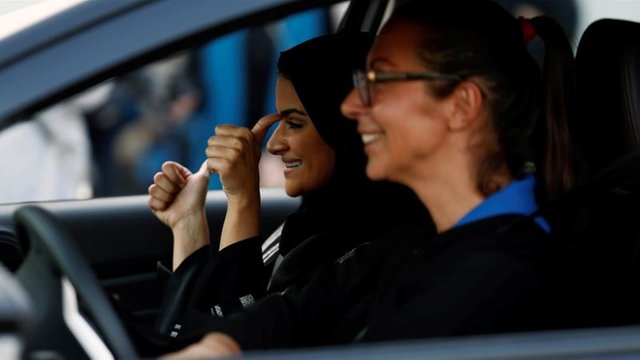Why did Saudi Arabia lift the driving ban on women only now?

A Saudi woman gestures as she sits in a car during a driving training at a university in Jeddah [Reuters/Faisal Al Nasser]
Starting today, women in Saudi Arabia are finally able to drive legally after a long-standing ban was lifted by a royal decree.
The unexpected decision to finally allow women to drive has been welcomed and praised by human rights campaigners across the world since it was first announced in September last year.
But there is still one question on many people's mind: Why did King Salman agree to do this, and why now?
For decades, the royal family - including Salman before he became king - has maintained unjust laws and patriarchal gender norms hurting women's rights. In 1990, it was King Salman who, as a governor of Riyadh, oversaw the harsh punishment of 47 women who participated in a major driving-ban protest.
All these years neither the king, nor his son and now Crown Prince Mohammed bin Salman (MBS), spoke out against this repressive system or supported women who were fighting against it.
So did King Salman or his son have suddenly become committed feminists or gender equality advocates? Or are there other reasons behind this move?
Saudi patriarchy and women's complicity
Saudi Arabia is an absolute monarchy. The king is the head of state, head of government, supreme commander of the armed forces and head of the Shura Council (the advisory council). State legislation is based on royal decrees and the royal family dominates almost every aspect of political and economic life in the country.
This system has stripped Saudi women of the rights that most Muslim women elsewhere enjoy. A woman in Saudi Arabia is legally treated as a minor from cradle to grave; she needs the consent of a male guardian to be able to study, travel, work, marry or obtain some official documents. A divorced or widowed mother is subject to the guardianship of her own teenage son.
Despite the grave injustices this system has resulted in, there have been some Saudi women who throughout the years have openly supported it.
There are some women, usually from privileged backgrounds, who wholeheartedly support the Saudi regime and argue that the only real change should come from the king.
They are supported and, sometimes, directly sponsored by the regime. While claiming that they work for the advancement of Saudi women's interests, they actively contribute to the silencing of anyone who dares to criticise the way the regime treats women.
One example is Kawthar al-Arbash, an appointed member of the Shura Council, which as a non-elected institution welcomed women for the first in 2013 under the late King Abdullah (the move was part of a number of reforms in response to the Arab Spring and did not reflect a genuine desire for the political empowerment of women). Last year al-Arbash stirred anger and controversy on Twitter when she called upon those "who still reckon that Saudi women are persecuted, isolated, deprived of progress, and have no empowerment opportunities [to] go back to the cave and cover up well".
There are also some Saudi women who openly campaign against improvement of women's rights in the country. These women, who usually come from middle-class families, run campaigns to protect the gender status-quo. They are driven by chauvinistic ultra-nationalism and conservative religious sentiments.
In 2009, one of these women, Rowdha al-Yousef, launched a campaign called "My Guardian Knows What's Best for Me" to counter the calls to abolish the male guardianship system. The supporters of the campaign claimed that movements aiming to liberate women in the kingdom are against Saudi/Islamic culture and values. This group is not necessarily sponsored by the regime, but they are offered platforms to spread their message.
The women who fought the driving ban are now in jail
Although public dissent is often suppressed in Saudi Arabia, there have been women who have struggled against gender injustice and discrimination.
They have been launching campaigns and submitting petitions to the king to end the driving ban and the male guardianship system for decades, but they have been neither supported, nor heard.
When in September 2016 activist Aziza al-Youssef went to King Salman's office to submit a petition to abolish the guardianship system, it was not accepted. Instead, she was told to send it "by mail".
Earlier that year, then-Deputy Crown Prince Mohammed bin Salman, who has been portraying himself as a reformist leader, told the Economist that Saudi has only 18 percent of its adult women working because they are "not used to working". Loujain al-Hathloul, a Saudi feminist and anti-driving-ban activist, challenged his statement and described it as "unfair of him to say" given the long waiting list of women seeking employment in the education sector.
Nice information
thanks
Its Good That Women In Saudi Arabia Are Now Getting Their Rights!!
yess atlast
Upvote this: https://steemit.com/free/@bible.com/4qcr2i